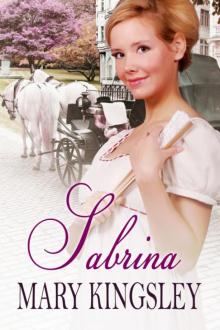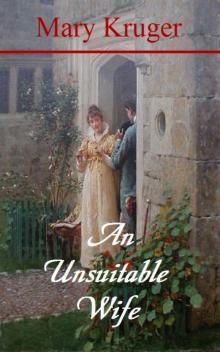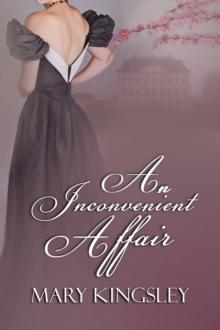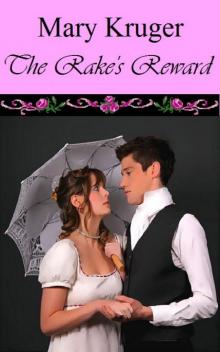- Home
- Kruger, Mary
Rogue's Charade Page 10
Rogue's Charade Read online
Page 10
“Yorick! Damn dog.” Porter’s rumble was very close. “Can’t think what’s got into you. Come on. And stop whining.” Yorick yelped, the sound of his paws scrabbling in the dirt echoing behind Porter’s heavy tread. Blythe let out a breath she hadn’t known she was holding. Disaster had been so very near. “Tomorrow we’ll search for any sign.”
“Tomorrow they’ll be gone, and I’ve nothing but a pair of ruined breeches to show for the night,” the cool, smooth voice said. “I shall hold you responsible for that.”
“Who was it that let Woodley escape in the first place?” Porter answered, and with that the inn’s door banged shut. Blythe and Simon were alone, save for the rustlings of small animals and the occasional chirp of a cricket.
Simon was the first to move, rolling his shoulders as he turned toward her. “Alas, poor Yorick.”
Blythe blinked. “What?”
“I knew him well. But who is that who’s after me?”
“I’m sure I don’t know.” Now that the danger was past, at least for the moment, Blythe was aware of how tired she was, down to her soul. “I am not the escaped criminal.”
“As you are with me, I don’t think that distinction will account for much.” He held out his hand to help her up. She ignored it, standing without aid, though she swayed with tiredness. There was nothing she wanted more than her hard, narrow bed in her tiny room in London.
“Where are we going?” she asked, falling in beside him.
“Away from here. If we can make progress tonight, we can rest during the day, when the hunt will be the fiercest.”
“I can’t,” she protested, stopping. “I just—can’t.”
He turned toward her, began to speak, and then stopped. The light was dim, but she thought perhaps his face softened. “Tomorrow we go our separate ways,” he said. “Have you a place to go?”
“Yes, where I used to live, in—”
“Don’t tell me.” He held up his hand. “If they capture me I won’t be able to tell them where you are.”
“Oh.” She stared at him. “You’ll let me go tomorrow?”
“I’d let you go now, if I thought you could walk without falling.” This as she stumbled on a tree root and was saved from a fall only by his hand, shooting out to catch her arm. “Best thing for us now is to get some sleep.”
How her life had changed, Blythe thought, tramping along beside him, trying to watch for obstacles in her path and to avoid bumbling into trees. She still wasn’t certain that she wouldn’t wake up and find this had all been a dream. A nightmare, more like. It was nearly over, though. Tomorrow she would be free, away from a criminal who was too attractive for her own good. Which was something he must never know.
There was nothing for it. She could not return to London, nor to the inn. Sighing, she squared her shoulders. She would simply have to resign herself to another cold, miserable night of sleeping in the woods.
Morning came damp and cheerless. Blythe had had quite enough of adventure. From where she was, trudging along the edge of a lonely, empty road, with anything worth seeing hidden by fog, adventure was vastly overrated. The heroines in the novels she’d read surreptitiously never seemed to notice mundane things such as wet feet and tangled hair, let alone more private problems; there were no privies in the woods. And she was hungry. Since the meal at the inn the evening before she and Simon had had nothing to eat, nor did food appear to be a likely prospect anytime soon. She wished passionately now that she had never left the shelter of Mrs. Wicket’s house, or more especially, her village. Even marriage to the widowed apothecary with his six children was beginning to look appealing.
“There’s a crossroads ahead,” Simon said, at last breaking the silence. “We’ll part ways there.”
Blythe looked dully up at him. “How do you know that?”
“Because of where you’re going—you did say south? —and where I have to go.”
“The coast is south, too,” she said, as if she actually still wished for his company.
He shrugged. “I’ll find means of leaving the country. ‘Tis the only thing I can do, I suppose.”
Blythe glanced at him, suspicious of his whining tone. He looked miserable enough, however, just as she suspected she did. Under such circumstances a bit of self-pity wasn’t unwarranted. “I hope you’re not caught,” she burst out.
He looked at her slantwise. “Why is that, princess?”
“Heaven knows.” Already she regretted her words. “Any right thinking person would want to see you hanged.”
“Then it must follow that you are not a right thinking person.”
“I’ll have you know—”
“Will you be all right?”
The gentleness of his voice stopped her in mid-tirade. “Of course I will. Why?”
He glanced away. “It might be difficult for you, where you’re going.”
“I don’t expect it to be easy. They’ll wonder why I’ve returned, and—”
“And they’ll probably know you’ve been with me the last two days.”
Her mouth dropped open. “Surely not!”
“I’m a wanted man, princess, and you helped me to escape. Do you not think they know who you are by now?”
“But I’ve lived a blameless life.”
His lips tightened. “Do you think that matters? Once people believe you’re guilty nothing you say changes matters.”
Blythe began to answer, and then stopped. Perhaps that was true for him. Not only had he been convicted, but he was an actor, a notoriously immoral profession. In the village of her birth, however, she doubted people would judge her the same way. “I think,” she began, just as his hand sliced down, gesturing her to silence. “What is it?”
“A carriage.”
“I hear it.” From the road behind she could just hear the rumble of wheels. “It sounds distant yet.”
“Fog plays tricks with sound,” he said tersely, as the noise suddenly grew louder. “Into the trees! Now!”
Hiding had become so ingrained a part of her that Blythe didn’t question him, but dove into the underbrush by the side of the road, grimacing only a little as a branch hit her in the face. Simon was close behind her, throwing himself down onto his stomach and peering out through the grass. So far this morning there’d been no sign of pursuit, but it was too much to hope their luck would last.
The sound faded again, and then Blythe could suddenly hear the horses’ snorting and breathing and the wheels creaking, so close it seemed the carriage was atop them. She clapped her hands over her ears and ducked her head, not certain why this traveler scared her more than others. Simon threw an arm over her shoulders, pulling her to his side, and she cowered against him gratefully. Only one small part of her brain was detached enough, calm enough to remark on the absurdity of her reaction.
Beside her Simon let out an exclamation, and suddenly he was up, bounding out of the trees onto the road. “Simon!” she gasped. “What are you doing—”
“Hey!” Simon was waving his arms at the carriage, close enough now for Blythe to see that it was an old black traveling coach, a crest apparently having been painted out on the door. It was followed by an odd-looking cart. Long and tall, it was enclosed at the top, and the sides were painted red and blue, with bits of gilt flaking off here and there. The carriage was drawn by a pair of knock-kneed, sway-backed, mismatched horses, and the driver was an old man, thin, hunched over, with greasy long hair falling unkempt past his shoulders. At sight of Simon he pulled hard on the reins, and the horses, tired nags that they were, stopped so fast that the cart jolted. “McNally!” Simon shouted as the driver jumped down from the box, and ran forward, grabbing the man around the shoulders and pummeling his back. “A sight for sore eyes, you are!”
“Joseph, what is it—Simon!” Another old man, this one bearded and portly, jumped out of the carriage, beaming. “I say! I was hoping we’d run into you.”
Simon laughed, looking suddenly years younger. “And what rol
e are you playing, my old graybeard?”
McNally chuckled, reached up his hand to his face, and, to Blythe’s astonishment, pulled off his beard. Why, he was in disguise. Who were these people?
“We’d heard you might be on this road,” the man was saying, slinging his arm about Simon’s shoulders, though he was shorter. “Caused a commotion at the Tabard, I understand.”
“Porter is not the friend I thought him.” Simon’s mouth was momentarily a grim slash. “And you?”
“On the circuit, of course, from theater to theater, and looking for you. Harry bid me to.”
“My uncle? Is he well?”
“Not that Harry.” The man chuckled. “The young ‘un. Henrietta. Got a tongue on her, that one. Should’ve heard what she had to say to Old Gaffer when she learned you’d never met up with him.”
“There’ll be time to discuss this later,” the driver interrupted. “No telling who else is on the road.”
“Yes. Get in, my boy, and we’ll see you’re safe—”
“I’m not alone,” Simon interrupted, and the two men looked at each other.
“We’d heard that,” the portly man said, frowning. “And just what is the story there?”
“You’re not my father, Giles, so don’t think to lecture me,” Simon retorted, and swung towards the woods. “Blythe? Come out, princess. We’re among friends.”
“Maybe to you,” Blythe muttered, cautiously clambering to her feet. She wasn’t certain she’d be any safer among a company of actors than she was with one alone.
The three men watched her as she stumbled through the brush to the road, and though Simon was smiling, the others were not. For people who made their livings emoting, their faces were remarkably still.
Simon came forward, holding out his hand. “The best of good fortune, princess,” he said, taking Blythe’s arm and leading her to the others. “We’ve been found by a troupe of actors. Not quite as good as the Woodleys, of course—”
“We haven’t all day,” the driver interrupted. Up close Blythe could see that he was much younger than he’d at first appeared. “Not if we’re to reach Rochester by evening.”
“I won’t keep you.” Blythe managed to keep her voice calm. “If you would just drop me at the next crossroads—”
“As if we would!” The portly man interrupted, and she realized for the first time that his appearance of age was also fraudulent. Below his graying hair his brow was unlined, his eyes sharp. “After what Woodley here had put you through, you deserve better than that. No, my dear, we’ll take you to safety.” He took her elbow in what was apparently meant to be a courtly gesture, though his hand squeezed a little harder than necessary. “Allow me to introduce myself. I am Giles Rowley, esteemed player and manager of the Rowley theatrical troupe. You should know,” he went on in a confidential tone, leading her to the coach, “that not all players are the arrant rogues our Simon is.”
“I am glad to hear that,” Blythe stammered out, looking from one to the other. Giles was smiling, and even the driver was nodding politely at her. It was very odd. After two days on the road with an escaped convict, here she was conversing as if she were in a drawing room. Madness. “Our driver, this redoubtable old man—”
“McNally,” the driver interrupted, and briefly swept the wig from his head, revealing startlingly red hair. “If we don’t get started, Giles, no tellin’ what will happen.”
“Those disguises can’t have fooled Porter,” Simon said, walking by Blythe’s side to the back of the cart.
“He doesn’t know we’re using them, does he?” Giles replied, opening the door of the carriage. “In with you, my dear. My wife is just inside, so you’ve naught to worry about.”
“Thank you.” Blythe clambered into the carriage. It was a moment before her eyes adjusted enough to see a very young woman pressed up against the carriage wall, her eyes huge. What on earth had she got herself into now?
“My wife, Phoebe,” Giles said, climbing in behind her and slipping his arm about the girl’s shoulders. “We’ve some members of the troupe in the prop wagon. The rest are on shank’s mare.”
“Walking?” Blythe said, though she didn’t know why she was so surprised. Hadn’t she herself walked the distance from London, twenty-two miles by the last milestone?
“Aye. You’ll meet them later.” He smiled down at his wife. “Phoebe tends to be shy.”
“A pleasure to meet you,” Blythe murmured. The girl shrank closer to Giles. Not how she expected an actress to behave.
Simon plopped down on the seat beside her, his breath coming out in a whoosh. “We made it, princess.” He grinned at her. “We’re safe.”
Blythe smiled back with great effort. Safe? Perhaps for the moment. But who were these people she’d fallen in with? And what was going to happen to her next?
“Once was bad enough.” Honoria gazed out the window, her hair dark as the night sky. “Twice? Far worse. But thrice, Quentin?” She turned, and though her face was calm, her knuckles clutching the fine golden brocade drapery were white. “Thrice you had him within your grasp, and thrice he escaped. It is inexcusable.”
Quentin bowed slightly. The drawing room of Stanton House was brilliantly lit by candles, dozens of them in sconces and candelabras. Their glow shone on the polished cherry side table and reflected in the pier glass hanging over the mantel. “I have no excuse,” he said frankly. “He has proven to be a devilish slippery character.”
“Do not think to charm your way out of this, Quentin. I am quite vexed.” The skirts of her taffeta gown rustled and swayed as she paced to a chair. Even in anger she sat gracefully, head erect, back straight, a beautiful, passionate woman, except for her eyes. They had taken on the hue of her gown and were pale lavender ice, regarding him with no expression whatsoever. Somehow that was more threatening than if she’d glared. “I thought you were competent, Quentin.” Her gaze flicked down over his loins, and than back up. “I find I have been sadly mistaken.”
Quentin stiffened, stung by the lash of that look. The rogue was proving to be more resourceful than they’d expected, and with more allies, but to say so would sound weak, puling. He would not grovel before her with excuses. Instead, he turned away. “Then I suggest, my lady, that you find someone else to do your dirty work. I wash my hands of this affair.”
“But you were glad enough to take my blood money,” she shot back, and Quentin stopped, just shy of the door. Something in her voice, a tone he’d rarely heard, held him. Could she be afraid? “Oh, come back, you idiot.”
Quentin turned, leaning a shoulder negligently against the carved paneling and casually straightening the frothy white lace at his wrist. He wore midnight blue velvet tonight, with white satin breeches and a waistcoat liberally embroidered with silver thread. Quentin enjoyed fine clothes. So far during this escapade he had ruined a pair of expensive boots, and some breeches. Someone would pay for that. “Such compliments you pay me, my lady.”
“Quentin, I am growing extremely vexed with you.”
“My apologies, my lady,” he said, still toneless.
“I don’t want your apologies!” She was on her feet now, her eyes alight with anger, hands on her hips and bosom jutting forward. He eyed it with frank fascination as she stalked toward him. “I want you to do what you promised.”
He let himself ogle her for another moment before raising his eyes to hers. “And what is that, my lady?”
“That you will take care of the upstart,” she hissed.
Quentin reached into his waistcoat pocket for his enameled snuffbox. Opening it one-handed in a seemingly careless gesture, he took a pinch of snuff, while Honoria glared at him, arms crossed over her chest. Honoria angry was far easier to handle than when she was cold, dispassionate. Either way, however, she was dangerous. And that only added spice to their relations. “I don’t imagine he considers himself an upstart.” He placed the snuff on the back of his hand and inhaled. “Ah, very good,” he said, though he sneezed. �
�A fine blend. I must commend the tobacconist when next I see him.”
“I care not about your tobacco—”
“I don’t believe he has any idea of who he is.” Quentin’s gaze sharpened. “It might be best to leave him in peace.”
“I shall have no peace while I know he walks this earth! He is a danger, Quentin. Not only to me, but to you, too. Must I constantly remind you of that?”
Quentin leaned his head back. “I believe he is heading for the coast, to leave the country. He is no threat, my love.”
“He had best not be.” She stepped abruptly forward. At the same moment he felt something press against his groin. Her eyes met his, and a chill of fear skittered down his spine. Oh, they blazed, those magnificent violet eyes, with cold fire and a calculating rage that was far more frightening than any tantrum could be. “Or you’ll suffer. That, I promise.”
The pressure against his groin increased, and he felt a quick shaft of pain. He would not look down, would not give her the satisfaction, but, in spite of himself his head bent. Her small white hand held a shiny, bejeweled, and very sharp dagger. “Would you damage that which has given you such pleasure, Honoria?” he said, voice trembling in spite of himself.
“This? Why, Quentin, darling, what makes you think this is so special?” She twisted the knife and then, as he recoiled, stepped back, teeth bared in a fierce grin. “But since it seems to mean so much to you, I shall spare it. This time.”
Damn, but it was hot in the room. There were beads of perspiration on his forehead, and his velvet coat felt heavy. “Thank you for your kindness, my lady.”
“Do not thank me yet.” She paced away, her posture straight, regal. “Find him. Find him and kill him, or it will go ill with you.”
Quentin’s lips thinned. Just moments ago he’d had the upper hand, or so he’d thought. His gaze flicked to the knife again. Now it seemed she’d been in control all along. “I’ll find him,” he said through stiff lips, his mind racing through all his possible courses of action. He could do as she bid, of course. He could leave the country himself; he had no kin, no property worth fighting for, though Lord knew where he’d go. Or he could do something else altogether, something to benefit himself. “I shall take care of him, my lady,” he said, and, giving her a sweeping bow, walked out of the room.

 Sabrina
Sabrina Rogue's Charade
Rogue's Charade Unsuitable Wife
Unsuitable Wife In a Pirate's Arms
In a Pirate's Arms Crystal Heart
Crystal Heart Inconvenient Affair
Inconvenient Affair Summer Folly
Summer Folly Rake's Reward
Rake's Reward Gifts of the Heart
Gifts of the Heart